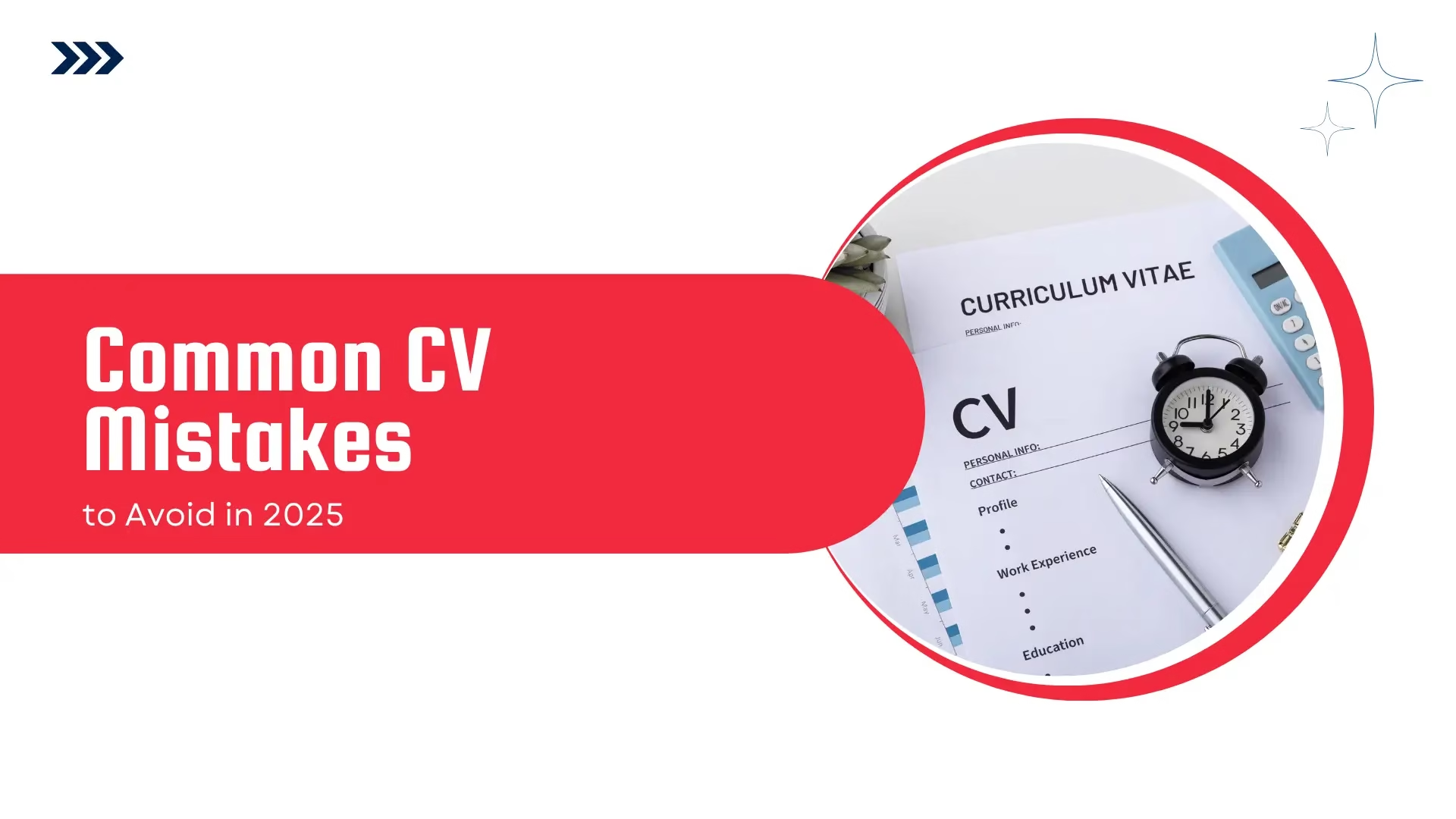Introduction
Your CV is often the first impression you make on a UK employer, and in 2025, competition is tougher than ever. Recruiters in the UK spend an average of 6-8 seconds scanning a CV before deciding whether to shortlist it. That means even a small mistake can cost you the chance at an interview. Whether it’s using US instead of UK spelling, writing a CV that’s too long, or including outdated formatting, these errors can instantly turn recruiters away.
In this blog, we’ll explore the most common CV mistakes UK job seekers make in 2025, explain why they hurt your chances, and show you exactly how to avoid them. You’ll also see expert insights, practical examples, and the latest hiring trends tailored for the UK job market. By the end, you’ll know how to craft a polished CV that catches attention, gets past applicant tracking systems (ATS), and secures interviews.
Why CV Mistakes Matter in 2025
The Importance of First Impressions
A CV is more than a list of skills and experience. It’s a marketing document designed to sell your professional value. Hiring managers in the UK are inundated with applications, and mistakes give them a reason to move on quickly.
ATS Systems Are Stricter Than Ever
Applicant Tracking Systems (ATS) are now used by over 98% of Fortune 500 companies and increasingly by UK firms of all sizes. Incorrect formatting, non-standard file types, or missing keywords can cause your CV to be filtered out before a human even sees it.
UK vs. Global Job Markets
While CVs and resumes may seem similar, the UK has its own unique standards. For example, spelling differences (analyse vs. analyze), date formats, and expectations around length and structure can all impact your credibility.
Common CV Mistakes in 2025 (UK Edition)
Using US Instead of UK Spelling
What it is: Writing “organize” instead of “organise,” or “color” instead of “colour.”
Why it matters: UK recruiters expect professionalism, and US spelling suggests carelessness or using a template not tailored for the UK.
How to fix it:
- Set your Word processor to UK English.
- Double-check for words like ‘programme’ vs. ‘program,’ ‘centre’ vs. ‘center.’
Incorrect CV Length
What it is: Submitting a CV that’s too long (4–5 pages) or too short (1 page for a senior role).
UK standard:
- Entry-level: 1 page.
- Mid-career: 2 pages (most common).
- Senior roles: Maximum 3 pages.
Pro Tip: Recruiters in the UK overwhelmingly prefer 2-page CVs, concise yet detailed.
Outdated Personal Details
Examples of mistakes:
- Including date of birth (not required).
- Adding marital status or nationality (irrelevant and may raise bias issues).
- Using an outdated email like Hotmail or AOL.
How to fix it:
- Include only name, phone number, professional email, and LinkedIn URL.
- Always use a modern email provider like Gmail.
Poor Formatting Choices
Common errors:
- Using tables, graphics, or multiple columns that confuse ATS.
- Overly decorative fonts.
- CVs saved as JPEG/PNG instead of Word/PDF.
Best practices for 2025:
- Stick to clean, ATS-friendly fonts (Arial, Calibri, Times New Roman).
- Use consistent headings and bullet points.
- Save as PDF unless otherwise specified.
Generic CVs Without Tailoring
What it is: Sending the same CV to every job.
Why it fails: Recruiters look for relevant experience and keywords specific to their job description.
How to fix it:
- Match your CV keywords to each job ad.
- Highlight relevant achievements, not just duties.
- Use strong action verbs: “Achieved,” “Led,” “Developed.”
Weak Personal Statement
Mistake: Writing vague summaries like “Hardworking individual seeking opportunities.”
UK trend in 2025: Personal statements should be targeted, achievement-based, and around 4-5 lines.
Example (weak): “I am a hardworking, reliable individual.” Example (strong): “Results-driven marketing professional with 5 years’ experience boosting digital campaign ROI by 40%. Skilled in SEO, content strategy, and team leadership.”
Overloading with Buzzwords
Mistake: Overusing words like “team player,” “results-oriented,” “self-starter.”
Why it hurts: Recruiters see these phrases as clichés. They want proof, not fluff.
Fix: Replace buzzwords with evidence.
- Instead of “excellent communication skills,” write “Presented monthly reports to stakeholders, improving cross-team collaboration by 25%.”
Listing Irrelevant Work Experience
Mistake: Adding every job since school, even irrelevant ones.
How to fix: Focus on the past 10-15 years and highlight roles relevant to the job.
Example: If applying for IT, leave out your part-time barista role unless it demonstrates transferable skills.
Ignoring Keywords for ATS
Mistake: Not optimising CV with role-specific terms.
How to fix:
- Scan job description for keywords.
- Use exact matches: If the ad says “project management,” don’t only write “managed projects.”
Incorrect Date Formats
UK standard: DD/MM/YYYY.
Mistake: Using US format (MM/DD/YYYY).
Why it matters: Shows lack of attention to detail.
Forgetting About LinkedIn
Mistake: Not adding a LinkedIn profile or leaving it outdated.
Fix: Ensure LinkedIn matches your CV. Add a custom URL to make it professional.
Step-by-Step Guide: Building a Perfect UK CV in 2025
- Start with contact details (name, phone, email, LinkedIn).
- Write a tailored personal statement.
- Add key skills section with 6–8 bullet points.
- Detail work experience in reverse chronological order.
- Add education section.
- Include certifications or training.
- Keep it to 2 pages.
Statistics: Why Fixing CV Mistakes Matters
- 61% of recruiters reject a CV due to typos (Source: CareerBuilder).
- 75% of CVs are rejected by ATS before a human sees them (Source: Jobscan).
- UK employers prefer 2-page CVs 85% of the time (Source: CV-Library).
Expert Insights
UK recruiters predict that in 2025, CVs with strong personal branding and measurable achievements will stand out most. Templates are helpful, but tailoring is essential.
Internal Linking Suggestion
If you’re struggling to avoid these mistakes, check out our CV writing services and career coaching blogs to strengthen your job search.
External References
- Jobscan: https://www.jobscan.co/
- CV-Library: https://www.cv-library.co.uk/
- CareerBuilder Study: https://www.careerbuilder.com/
Conclusion
Your CV is the gateway to your next career opportunity. In 2025, avoiding common mistakes like using US spelling, creating overly long CVs, or ignoring ATS rules can make all the difference. By tailoring your CV, highlighting measurable achievements, and presenting information clearly, you’ll position yourself as a strong candidate in the competitive UK job market.
If you want to ensure your CV is error-free and job-winning, get your CV written by experts today and stand out in every application.
FAQs
1. What is the ideal CV length in the UK in 2025?
Most recruiters prefer 2 pages. Entry-level candidates may use 1 page, and senior roles can stretch to 3.
2. Should I include a photo on my UK CV?
No. UK recruiters do not expect photos and it can introduce bias.
3. Is it okay to use US spelling on a UK CV?
No. Always use UK spelling like “organise” and “colour.”
4. How do ATS systems impact UK CVs?
ATS filter out CVs that lack keywords or use the wrong formatting, so optimise for job descriptions.
5. Do I need to list all my jobs since school?
No. Focus on the last 10-15 years of relevant experience.
6. Should I include references on my CV?
No. Simply write “References available upon request.”
7. Can I use creative CV designs in 2025?
Only for design-related roles. For most industries, keep formatting clean and ATS-friendly.
8. Should I still write a personal statement in 2025?
Yes, but keep it tailored, concise, and achievement-based.
9. How can I make my CV stand out in the UK job market?
Tailor to each role, use metrics to show achievements, and keep formatting professional.
10. What file format should I use for my CV?
PDF is safest unless the job ad specifies otherwise.

